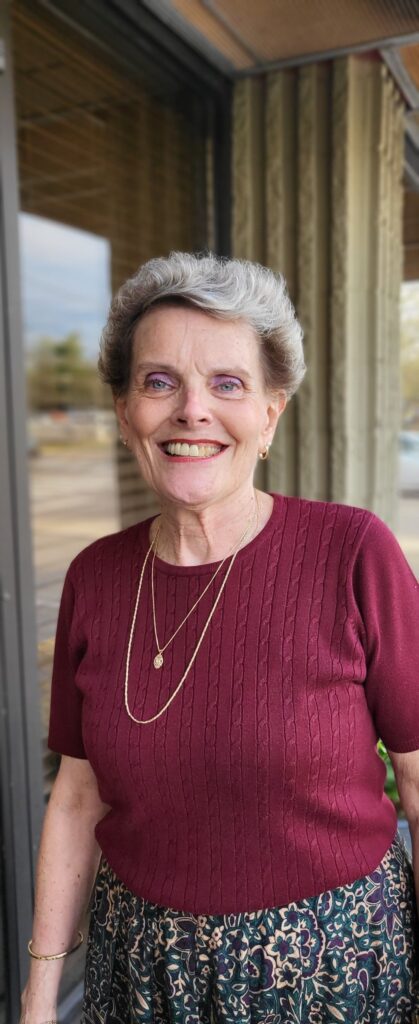Alumni Spotlight Jane Grannis (AS ’69)
Posted on Thursday, April 27, 2023

From time-to-time, Aquinas Newsletter features articles on interesting alumni of the College. The following is one such report. On a recent Friday evening in February, Aquinas Newsletter staff reached out by phone to Aquinas Junior College alumna, Jane Grannis (AS, 1969). It was soon evident that Grannis would be a valuable source of information about the College’s history nearly from its inception (1961) until today. The following conversation was edited for clarity and continuity from notes taken during the one-hour interview of Thursday, February 23, 2023.
Staff: Thank you for allowing Aquinas to interview you for our Newsletter. Tell me a little about yourself and how you came to be a student at Aquinas.
Grannis: I attended Aquinas from 1967-1969. It was a Junior College at the time and fairly new [Editor’s note: Aquinas Junior College was founded in 1961]. Aquinas was not my first choice, but God’s hand was in it. I had graduated from Saint Cecilia Academy that spring and was accepted at Siena College in Memphis, but learning that Siena might be closing soon, I decided I needed to make a decision right away. I didn’t want to be out of school for a year and Aquinas Junior was local. I knew the Sisters, that they would provide a quality education and knew that I could transfer to MTSU for my four-year degree, after completing my program at Aquinas, so I applied and was accepted in the Fall of 1967. Several of my friends from St. Cecilia were also going to Aquinas. Looking back, it was a good move. It was good value too. I think it was about $12.50 per credit hour at the time, which seems unbelievable today.
Staff: $12.50! That’s more than economical in today’s reckoning. You say that you had gone to St. Cecilia Academy, so you were already very familiar with the existence of the College, which shares the same campus, with Overbrook Catholic School and Saint Cecilia Academy. Were you raised Catholic? Was it important for you to go to a Catholic school?
Grannis: My Father was Catholic. My mother wasn’t Catholic, but she participated in my education at St. Cecilia and they both supported my desire to get a good education. I was the third of six children. We knew that the Dominican Sisters would provide that. Aquinas was quite small at the time, just the one building, except that Biology was taught in what we called the “Little White House.” Everything else was in the one [Main] building, the classrooms were almost all there, the offices were there, the library was on the second floor, I think, and a snack bar was in the basement, with soft drinks and a snack machine.
Staff: Tell me about what you remember of the faculty. Looking back, were there any faculty that made a particularly significant impact for the direction your life would take?
Grannis: Sister Mary Leonard taught Biology. She was great. She really wanted to make a difficult subject understandable to her students and encouraged them. They all did. I think she is in the infirmary now [at the Motherhouse]. Not many are still with us; several have passed [away]. I remember Sr. Cecilia, she was the librarian, I think, and taught Speech. Sr. Aloysius was there. She once taught New Testament as a special course, but she was there mainly, I think, as Registrar. I was in that class. Sr. Mary Bernard taught English. Sr. Dominica was there, of course. Sister Mary Leonard and Sister Dominica recently celebrated their Jubilee, and I attended, as did several former students. You should have heard the testimonials from the basketball players at the Jubilee celebration. Sister Mary Leonard could talk to the guys about basketball. They loved it. Basketball came to Aquinas after my time there. It was a successful program. The former players said it well: these Sisters really did make a great effort to instill in us students a love for learning and a determination to finish our education beyond the two-year program offered at Aquinas.
Staff: It sounds like all the faculty were instrumental to your education.
Grannis: Yes. They were willing even to tutor those who needed assistance and made us want to succeed. This was the atmosphere of the entire College.
Staff: Did you have any faculty who were not also members of the Congregation? What were their classes like?
Grannis: Yes. Father Hofstetter taught Psychology. Mrs. Jordan taught Math, and Dr. Dressler taught foreign language, French, I think. I had already fulfilled Latin and Spanish at Saint Cecilia, so did not require it in college.
Staff: Did you ever sense any big differences between the religious and lay faculty? Were all the students Catholic? How well did the College community interact with one another?
Grannis: To my knowledge, no one ever felt conflict. The mix was great. Everyone felt welcome. There was a lot of encouragement, and many hugs and a united desire to focus on studying while I was there. At the Jubliee, I remember one of the former basketball stars raised in a non-Catholic family saying that when he decided to attend Aquinas, his mother was shocked that he said he was going to attend a college led by “NUNS”! The school was so small, everyone helped everyone else, and we didn’t have the distractions that so many students at larger schools have.
